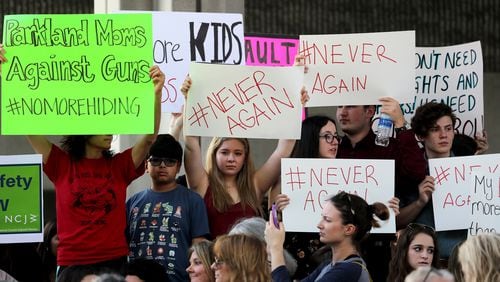No Georgia public college has reassured high school applicants and those already admitted they will not risk rejection or revocation by participating in Wednesday's 17-minute walkout to honor the students and staff killed in the Parkland, Fl., school shooting three weeks ago.
The campuses apparently have been told by the Board of Regents they cannot speak out, even though peer institutions around the country had stood up for students willing to risk punishment to call for stronger gun laws and better security measures.
I have heard from University of Georgia and Georgia Tech students stunned their leadership remains silent. In a guest column today, a Georgia Tech professor shares his hope his campus will match the courage of the Florida students organizing the walkout and extend its support for their civic engagement.
Joshua S. Weitz is a professor of biological sciences at the Georgia Institute of Technology. He wants to emphasize these are his views and not those of Tech.
By Joshua S. Weitz
The Parkland shooting is a watershed moment in efforts to reduce gun violence in schools and communities across the United States. Teenagers are leading this moment. Many are survivors of gun violence and mass shootings. Others are connected to survivors through friendship, family, or shared concern.
These teenagers demand a change at all levels of society, so that pre-schools, elementary schools, middle schools, high schools, and universities can remain sanctuaries of learning. They will seek the same change for society at large. But this change won’t be easy. It will take courage.
The courage to speak out and oppose current laws. The courage to walk out of class while risking disciplinary punishment and other threats, to meet lawmakers, and to demand an end to the status quo on gun laws that do not keep us safe.
What should institutions of higher learning do in response? Following on Parkland, more than 250 colleges and universities, both public and private from across the United States – from Texas to Florida to California – have communicated a simple message: the admission status of students who engage in peaceful protest will not be jeopardized.
Many of these statements do not mention guns. Indeed, the Parkland shooting will not be the last issue that compels students to speak out. Students should know that institutes of higher learning will not require they sacrifice their conscience to enter through the gates of professional society.
Yet many colleges have not yet spoken up. As one anonymous administrator put it in The Chronicle of Higher Education, "Our position is that we're not going to hold it against students, but there's a fear of announcing it publicly. What a major missed opportunity to make an important statement."
Critically, the entire University System of Georgia, including Georgia Tech – my home institution – has thus far remained silent.
Georgia Tech's motto is 'Progress and Service'. In doing so, the Institute expects students to graduate with technical skills and an understanding of how their work might serve society as a whole. As such, it would seem apparent that institutes of higher learning, like Georgia Tech, would want to send the clearest signal possible that civic engagement and first amendment rights remain cornerstones of our society.
Courage - at the institutional level – requires a public commitment to principles reinforced by actions. If member institutions of the University System of Georgia are to remain leaders in the broadest societal sense, they should commit to accepting students willing to take steps to serve the greater good.
Nationwide student walk outs are scheduled for March 14th. There is still time to act.







